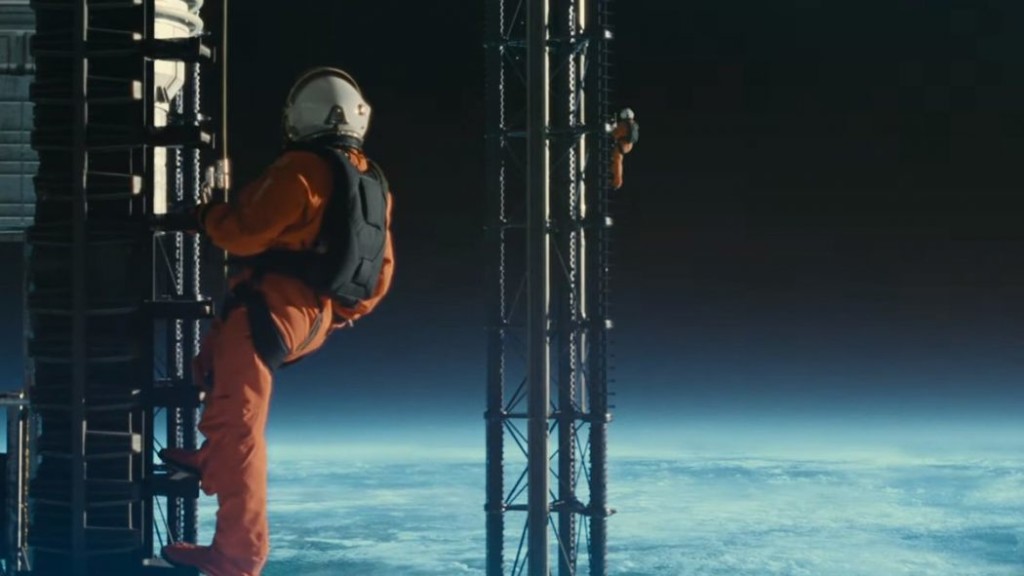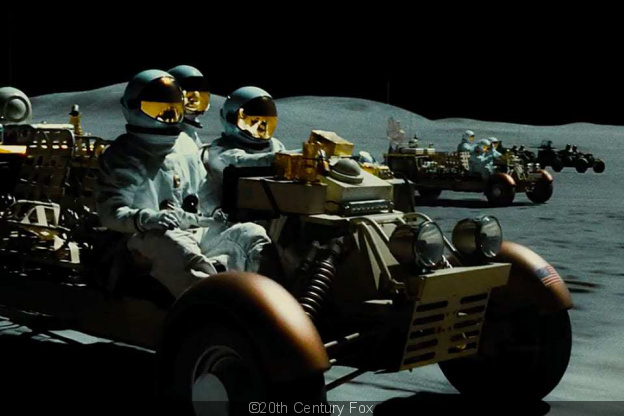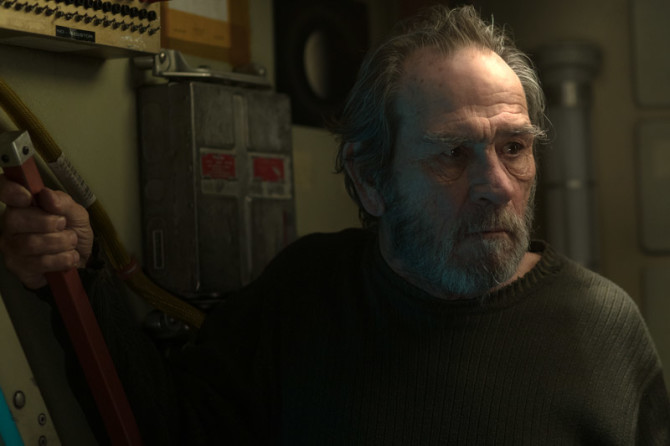Genre: Science-Fiction
Premise: In the near future, a series of mysterious electrical surges threaten earth, forcing the planet’s best astronaut to travel to the farthest regions of the solar system to stop them.
About: The zig-zagging flight that was Ad Astra’s path to the box office finally landed this weekend, netting the film a respectable 20 million bucks. It wasn’t enough to beat Downton Abbey, though, which somehow inhaled 30+ million dollars to top the weekend. I knew something special was going on when I saw a line of people at the Arclight dressed in 1920s clothes to see a showing. Your fanbase has to be pretty hardcore to pull that off.
Writers: James Gray and Ethan Gross
Details: 2 hours and 2 minutes
I was going to review Between Two Ferns today because it’s a really funny movie. The problem was there was zero to learn from it. I mean, seriously, what is there to learn from that project? Um, if someone comes to you with an idea that was never meant to be a movie but Netflix is paying the creator 20 million dollars to turn it into one, and they’re like, ‘sure, why not,’ make sure you’re ready to adapt it? I guess that’s the lesson? Whereas with Ad Astra, there are several million screenwriting topics to discuss.
Like there’s a scene late in the film where Pitt’s character, Roy McBride, is on Mars, and he has to sneak onto a rocket that’s going to Neptune. You could see the screenwriting challenges Gray was dealing with. The first is that a rocket traveling from Mars to Neptune is such a rarity, that the launch process would be airtight. If any little thing was off, they would postpone the flight. So Gray has to get McBride on the outside of the rocket just as it’s counting down. If he gets him there before that, they would’ve stopped the launch.
This leads to an unbelievable situation whereby McBride opens one of the rocket doors as the ship is launching. But again, it was the only screenwriting way to do it. Then, after he got in, I realized, Gray has to get rid of all these astronauts somehow. Cause McBride has to get to his father alone. That’s the only way the movie works. So I’m thinking, “How is he going to do that?” No sooner than 30 seconds later, the captain orders the crew to attack McBride. This allows for McBride to kill the entire crew under the guise of “protecting himself,” and now we get what the writer needs, which is for McBride to be alone on his trip to Neptune.
This might be boring to you but this kind of stuff is fascinating to me. Each script you write is an endless well of problems that you have to solve. And the writers who are able to solve the problems in the most creative and invisible way are the ones who get all the accolades.
If you know nothing about this movie, it’s got a pretty cool plot. There’s something called “The Surge” emanating from deep space and it keeps knocking earth’s electric grid offline. They think that if these surges continue, it could spell the end of us. So they enlist astronaut, Roy McBride, to go on a top secret mission. They explain to him that his famous father, who disappeared 15 years ago searching for E.T. on something called “The Lima Project,” is actually still alive. And they think he’s connected to the Surge somehow. Roy’s job is to travel to Mars so they can send a “secure transmission” to his dad, which they hope will give them some answers.
Back to screenwriting problems. Another issue Gray was dealing with was that this was a script about Roy getting to his father. However, for some reason, Gray didn’t want that to be the initial goal. So he has to come with this intermediary goal, which is the whole “secure message” plotline. Roy must get to Mars because that’s the only way to send a “secure message.” Except that makes zero sense. Why couldn’t they have Roy record a message then have someone else take the message to Mars? Having Roy himself go was a very inefficient way to achieve the goal. Of course, it was all smoke and mirrors – a way to get Roy to Mars so that we could continue with him to Neptune. Or, in simpler terms, if Roy doesn’t go on a mission, there’s no movie.
What’s different between the original draft and this one? Not much. One medium change and one big one. In the script there was a planet between Mars and Neptune they went to. I liked that because that was the whole idea behind the movie. That he gets further and further away from earth. Each planet he went to had a smaller and smaller outpost, which was a great visual representation for how far away he was.
They replaced that other planet with a “mayday” scene where they boarded a remote space station only to find that the astronauts had been eaten by their crazed lab monkeys. I’m going to go ahead and chalk this up to a studio note. I can see a studio saying, “There’s not enough going on here. He just goes from planet to planet and looks depressed. Can we have one fun sequence at least?” And so they put that in. And I have to admit it was a pretty good scene. Like a contained horror movie.
The other big change they made was to the ending. In the script, the ending was that Roy’s father was trying to replicate the Big Bang. That’s what the surge was – reactions from those attempts. The reason he was doing this was because all his messages sent out to E.T. came back with nothing. There is no other life out there. And so in his dad’s logic, he wanted to “try again,” basically. Create another universe so that we could get it right this time – have life in multiple solar systems.
I’m guessing that Disney found that ending a tad bleak and made them reshoot it. Which is why the ending now is so nonsensical. He sees his dad. Dad tells Roy that he doesn’t care about him. Then Roy tries to take him home but his dad jumps off the ship to his death. You’re not really sure what you were supposed to take from the ending. And the reason is that the whole plot of the original script was built up for that original ending. So if you add any other ending, it’s not going to work. You’d have to go back and rewrite every setup in the movie, since every setup was set up for a different ending.
Another thing about this ending, which I want to turn into a broader discussion about screenwriting – I read lots of scripts where son/daughter looks for dad/mom. And the whole point of the movie is the ending scene when they finally confront their parent.
Here’s the problem. It never works.
And here’s why. If the parent apologizes and says I love you, a) it’s too easy, b) it’s cliche, and c) it doesn’t make sense. If they loved you that much they wouldn’t have left you. So some writers, like Gray, take it in the opposite direction. The parent says I don’t love you. I’m not interested in a relationship. Which results in the audience saying, “So then what was the point of the movie?” There isn’t a lot of wiggle room between those two options, so the ending is always unsatisfying.
And the more the parent talks, the worse it gets. If the parent goes on a big monologue, it’s NEVER SATISFYING. Because think about it. What could the parent possibly say that would explain leaving their kid for 20 years?
Despite all this, I really liked this movie. That might be confusing to you since I trashed the script. But the rare times when a bad script turns into a good movie occur when the writer is the director. That’s because they’re not writing to win a reader over. They’re writing from a technical place. They want to make sure the blueprint is laid down for them to shoot. They know stuff the pure screenwriter does not, like where they can build up the score to drive a moment home. The screenwriter doesn’t control that. The director does.
Ditto how they direct the actor. A good director knows how to convey an intense emotional beat just by getting the right close-up of the actor and giving him solid direction. I remember a specific moment where that happened in this movie. The government takes Roy aside and tells him that his father is still alive. This is a guy who thought his dad died 15 years ago. Gray stays close on Pitt and we see him internalize this monumental realization. No screenwriter, no matter how good they are, can write that on the page.
And that was the difference for me from script to screen. I cared about Roy McBride a lot more when Pitt inhabited him. You could tell Pitt gave everything to this role. There was something deeper in him than I usually see. And like I always say, if you can get the audience to connect with your protagonist on an emotional level, the rest of your script doesn’t need to be perfect. Because we’ll now go anywhere with that character. We just want to see him okay. I wanted to see Roy find fulfillment.
So this was a really pleasant surprise for me because I expected Ad Astra to be a rough ride.
[ ] What the hell did I just watch?
[ ] wasn’t for me
[xx] worth the price of admission
[ ] impressive
[ ] genius
What I learned: If you’re writing a “Find Daddy” script, you have to find a clever way to do the final scene where they meet. Because if you’re only relying on, “Sorry, I screwed up, but I love you. I watched you from afar and kept track of your life and blah blah blah,” that ain’t gonna work. You know a movie that handled this in a really clever way? Field of Dreams. Because when the dad finally arrives, he’s a ghost. So he doesn’t know Ray Kinsella is his son. This allows for their conversation to be all sub-text as opposed to on-the-nose apology-I-love-you nonsense. So get creative on these endings guys!




